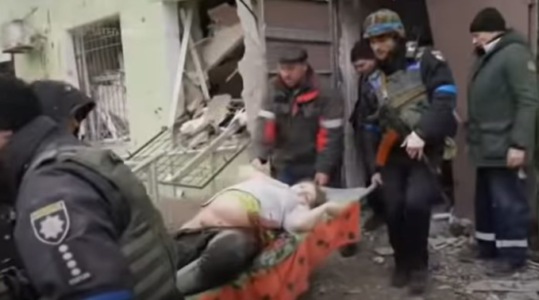Mariupol Attack Highlights the Horrors of War
MARIUPOL, Ukraine: A pregnant woman and her baby have tragically lost their lives after a Russian airstrike targeted the maternity hospital where she was scheduled to give birth, as reported by The Associated Press. Images of the woman being rushed to an ambulance on a stretcher have circulated globally, symbolizing the devastating impact of the attack on the most innocent.
Footage captured by AP journalists on March 9, following the bombing, showed the woman clutching her bloodied abdomen while rescuers navigated through the debris in besieged Mariupol. Her pale face reflected the shock and horror of the moment, marking one of the most brutal episodes in Russia’s ongoing war against Ukraine.
After the attack, the woman was transported to another hospital closer to the front lines, where doctors fought to save her. In a heart-wrenching moment, realizing she was losing her baby, she cried out, “Kill me now!”
Surgeon Timur Marin reported that the woman’s pelvis was crushed and her hip detached. They performed a cesarean section, but the baby showed “no signs of life.”
“More than 30 minutes of resuscitation efforts for the mother yielded no results,” Marin stated on Saturday. “Both died.”
In the chaos following the airstrike, medics were unable to obtain the woman’s name before her husband and father arrived to collect her body. They expressed relief that someone had come for her, preventing her from ending up in the mass graves being dug for Mariupol’s increasing death toll.
Russian officials, accused of war crimes, claimed the maternity hospital had been seized by Ukrainian extremists and was no longer being used for patients or medical staff. The Russian ambassador to the UN and the Russian Embassy in London dismissed the images as “fake news.”
Journalists from The Associated Press, who have been documenting events in blockaded Mariupol since the war began, witnessed the attack and its aftermath firsthand. They recorded video and images of bloodstained pregnant women fleeing the devastated maternity ward, with medics shouting and children crying.
The AP team subsequently located the victims at a hospital on the outskirts of Mariupol where they had been moved.
In a city that has been deprived of food, water, power, and heat for over a week, electricity from emergency generators is reserved for operating rooms. As survivors recounted their experiences, explosions echoed outside, with sporadic yet relentless shelling and gunfire.
Blogger Mariana Vishegirskaya gave birth to a girl the day after the airstrike. She cradled her newborn, Veronika, as she recounted the harrowing bombing. After photos and videos showed her navigating debris-strewn stairs while clutching a blanket around her pregnant belly, Russian officials accused her of being an actor in a staged incident.
“It happened on March 9 in Hospital No. 3 in Mariupol. We were in our wards when windows and walls shattered,” Vishegirskaya, still wearing the same polka-dot pajamas she had on when she fled, told The AP. “We don’t know how it happened. Some managed to cover themselves; others did not.”
Her experience is just one among many in Mariupol, which has become a symbol of resistance against Russian President Vladimir Putin’s attempts to undermine democratic Ukraine and reshape the geopolitical landscape to his advantage. The failure to capture Mariupol has forced Russian forces to widen their offensive in other parts of Ukraine.
Meanwhile, the port city, home to 430,000 residents and crucial for establishing a land bridge from Russia to the Russian-annexed Crimea, is slowly succumbing to starvation.
In the makeshift maternity ward, the tension rises with each new birth. “All birthing mothers have endured so much,” noted nurse Olga Vereshagina.
One distraught mother, who lost several toes in the bombing, underwent a C-section on Friday. Medics carefully extracted her daughter, vigorously rubbing the newborn to elicit signs of life.
After a few breathless moments, the baby let out a cry.
Cheers of joy erupted in the room. Newborn Alana cried, her mother wept, and medical staff wiped tears from their eyes, celebrating a small victory amidst the overwhelming tragedy.








